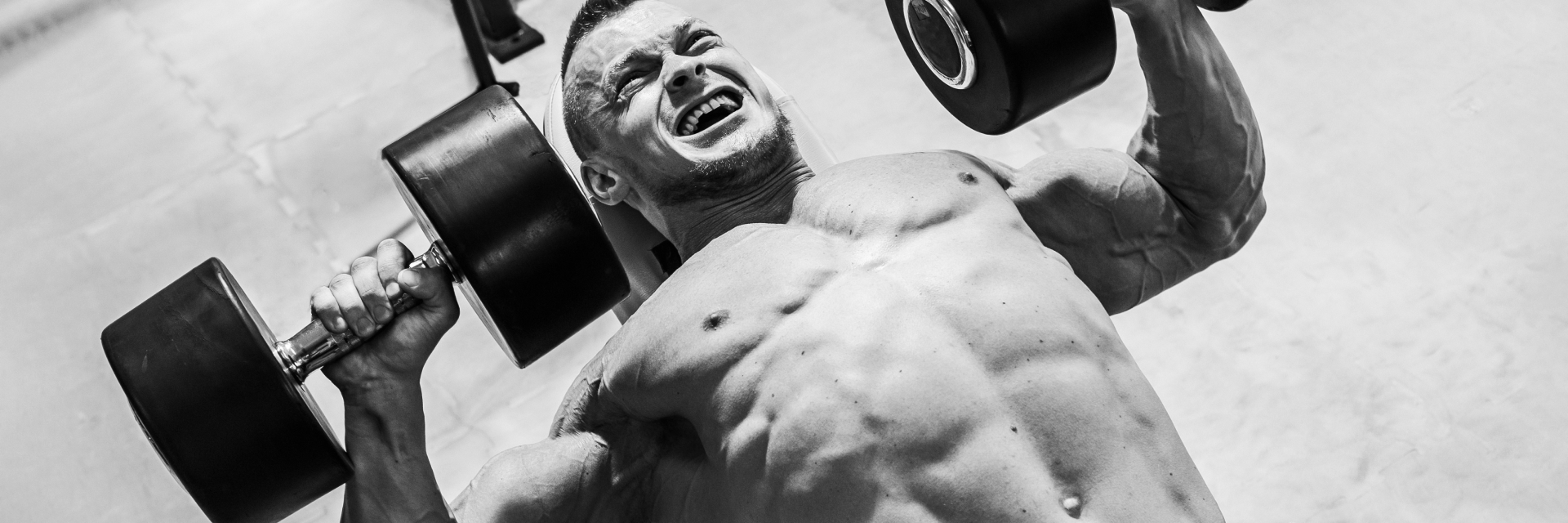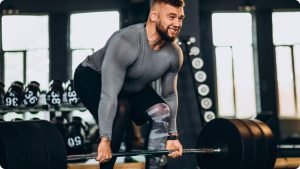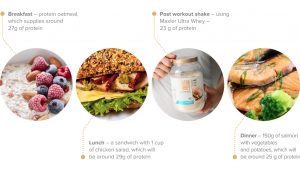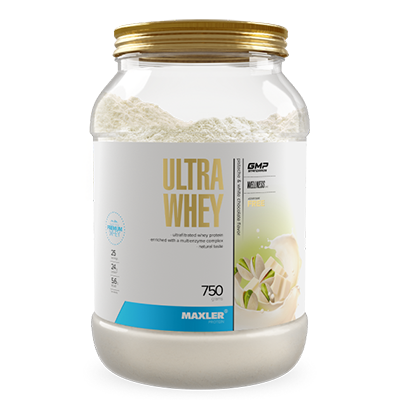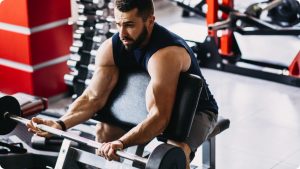Are you spending hours at the gym trying to build muscle, but it’s just not quite working? You seem to be training hard, getting enough sleep, eating healthy – but you’re not seeing the results you need. If that sounds like you, it’s time to look at your nutrition and understand whether your protein levels are to blame. Getting sufficient amounts of this macronutrient can help you reach your goal of muscle gain.
Do I need a protein powder?
If you’re on a journey to build muscle, you need to make sure that your nutrition is helping you as much as it can. That means providing your body with enough protein to not only restore the muscle you damage during exercise, but also build new muscle. Can you do that without using protein powders? Yes, absolutely.
Ensuring that you’re getting plenty of the macronutrient with every meal can be challenging but will help you get results. For some people however, guzzling down three eggs for breakfast or a turkey sandwich for snack might not sound appealing or just be possible.
Some people may be adhering to certain diets, not be able to eat certain whole food protein sources, or simply feel uncomfortably full if they’re having a large breakfast or snack. If that’s the case for you, then a protein powder can help you on your journey.
The beauty of protein powders is that they are convenient. They make it easy to enrich a food with protein or they make a great and light option for a snack or a breakfast for those with small appetites. Adding them to smoothies or simply having them on their own also allows those that have a busy routine to remain consistent with their intake while on the go.
If a protein powder sounds like it’s for you, read on.
What protein to take
Is there a difference between the types of protein you can have? If you choose them wisely, probably not. Your protein can and should come primarily from food sources. These can be both plant-based, such as tofu or tempeh, or animal based, such as the gym-bro favorite chicken breast.
However, many people might find it hard to plan their meals to have the right amounts of protein every time. This is where supplements like protein powders come handy. We’ll take you through each type and why it might suit you.
If you’re deciding on a supplement, remember a few things:
-
Make sure you trust the quality of the supplement – look for brands that are clear about where their raw material comes from
-
Ensure that you’re picking something that has been made to high standards
-
Look out for fillers or things you don’t need
-
Experiment and find a protein powder that works for you, as certain may have added digestive enzymes or other things that help you tolerate and absorb it better
Whey protein
This is a cult classic and will typically be the one that most people use. Whey is a protein that is suitable for vegetarians and omnivores. It’s manufactured from milk, and there are three main types of this supplement:
- Hydrolyzed whey – great for a quick and efficient amino boost
- Concentrate – typically the cheapest and most popular form, it’s about 80% protein but it does contain some fats and carbs
- Isolate – this is the high-protein form with up to 90% of protein by weight. It undergoes a bit more processing but is great for those wanting a large dose without many additional calories
Some protein powders will have a mix of all three forms, so choose what suits you best. If you don’t tend to handle lactose very well, certain brands make lactose free whey like like Ultra Whey Lactose Free.
Casein
This form of protein can be a little bit more of an acquired taste. It’s also obtained from milk, but it has a slightly different structure. That means it takes longer for us to digest, which is great if you want a continuous supply of aminos to keep you going. It is also often preferred when you’re baking things!
Weight gainer
This is not quite a protein type; however, gainers are useful for certain people. They usually consist of a protein and a carb blend and tend to have plenty of each macronutrient. If you’re aiming to increase your intake of calories and your protein, a gainer is a fantastic and easy solution.
You can read more about these in our post that’s all about gainers.
Egg protein
If you’re not into milk, eggs might provide a good option. It’s typically made from egg powder and is a great choice as it has very little additional fat and carbs. It can be especially good for those who might not digest milk very well.
Soy protein
This type of protein is actually a complete protein, meaning it’s got all the aminos you need. Additionally, it’s got plenty of BCAAs, which can help you with recovery and growth. A serving tends to have a good amount of protein in it. It’s a great option for a plant athlete.
Rice protein
It’s a good option for a protein, but it doesn’t have as much lysine as other sources, so add some foods with that amino for optimal effects. However, that doesn’t mean it’s not effective – it can be as effective as whey for building muscle, which is great news for the plant-based athletes.
Hemp protein
This is a protein with great additional nutrients like omegas and even minerals. However, it can be lower in its protein content and it doesn’t have all the aminos. So, you’ll need to make sure that you’re getting the missing aminos from other sources.
Pea protein
A common type of vegan protein, pea protein is widely used to grow muscles. That’s because it’s quite high in BCAAshttps://pubmed.ncbi.nlm.nih.gov/25628520/, which help send signals to cells to grow muscle. However, it can be lower in other amino acids like methionine, so make sure you’re adding good sources of it from other foods.
How much protein to take
You need to have sufficient protein in order to build your muscles. And that means understanding how much you are currently getting and how much you should be getting.
The minimum you should be eating to stay healthy is around 0.8 g of the macronutrient a day per kilo of your weight. However, that’s not that much when you think about it.
When you’re trying to grow muscle, you can increase your intake anywhere from 1.6g to 2g per kg. High performance athletes or those with a high amount of muscle already might need to be near the higher end of the spectrum.
One of the key things to remember is that you shouldn’t be afraid to increase your protein intake. If you fear becoming too bulky, you’re in luck – muscle gain is hard enough as is and adding a bit of protein to your day won’t make you the next Hulk. It will, however, support your want for a healthier and more muscular build.
A good way to help you manage your intake is through diet journals. Keep track of how much protein the foods you eat contain. That way, you will be able to understand when you can increase your intake, or when you’re not having sufficient amounts in a meal. This can be especially helpful for those depending on plant sources, as it’s quite easy to overestimate how much protein is in a can of beans.
When to take your protein
One of the most important things is timing your protein right. Your body is constantly going through the processes of muscle breakdown and growth. They tend to happen simultaneously but are in a balance. In order to put on muscle, you need to make sure that the building happens more than the breaking. A good way to do so is to supply protein to your muscles.
Since these processes are happening all the time, there’s a need to have some protein consistently throughout the day. Aim to get at least 20 g of protein with every meal or snack you have.
But what does that mean in practice?
Let’s do some quick maths. Suppose you’re trying to build muscle, and you currently weight 70 kg. For each kilo of your weight, you want to be eating anywhere between 1.2 g of protein per day to a whopping 2 g. Let’s say you want to start off eating 1.5g/kg.
That means your intake would be around 105 g of protein every day. Let’s say you eat three meals a day and have a post-workout snack. You’ll need to get an average of 26g of protein in every meal. That can look something like:
- Breakfast – protein oatmeal, which supplies around 27g of protein
- Lunch – a sandwich with 1 cup of chicken salad, which will be around 29g of protein
- Post-workout shake – using Maxler 100% Golden Whey – 24 g of protein [DE] Post workout shake – using Maxler Ultra Whey – 23 g of protein
- Dinner – 150g of salmon with vegetables and potatoes, which will be around 25 g of protein
Sounds simple enough, right? As long as you have your protein consistently throughout your meals, you’re set. However, there are times when protein is especially beneficial.
Protein before workouts
Heading to the gym? Have a high-protein snack beforehand. This will make sure you’ve got amino acids to help your body build muscle. This can be especially useful if you’re working out and it’s been a while since you’ve eaten, or if you’re heading to train straight after you awake.
As long as you feel comfortable training after you’ve had your snack, you will be helping your body grow the muscles you want. If you’re not a big fan of eating before a grueling training session, no worries – as long as you get the nutrient around the time of your workout, you’ll get the same benefits.
Protein after workouts
Finished your workout? Then it’s a fantastic time to think about optimizing your muscle growth. As you may know, your training provides a stimulus for the muscles to grow. In order for them to build muscle, they need building blocks. So, straight after a workout, you should be feeding yourself and your muscles.
It’s best to have about 15-20 g of protein powder within an hour or two after finishing up at the gym. For an even greater effect, consider pairing it with a high-quality carb source, which will benefit your overall recovery.
If you’re curious as to how both your nutrition and your exercise affects the process of growing muscle, then check out our post on how muscles grow.
After you wake up
Are you in the habit of regularly skipping breakfast? We’re not going to judge you, but your breakfast is a super great time to get some of that protein in. It’s not only great for your overall physique, but it’s also fantastic for keeping you full. This makes a high-protein breakfast essential for those that are trying to shed some pounds. You’ll not only be fueling the muscles that you’re trying to grow, but you’ll also be helping yourself get rid of unnecessary fat. It’s truly a win-win!
If you’re not sure how to start your day off with protein, there are a few things you can try. Traditional breakfast items can be tweaked – eggs are a great source of the macronutrient and they’re super versatile as well. If you like a bowl of warm porridge or overnight oats, you’ll easily be able to add some protein powder to them. This will help you with satiety and can add flavor to your breakfasts.
Alternatively, if you don’t have time to cook in the morning or just want something that’s not too heavy, consider smoothies or yoghurt pots. Enrich these with some protein powder, and you’ll be set with a breakfast you can have on the go and that won’t make you feel uncomfortably full. It’s mainly about making protein first thing in the morning and priority, and figuring out a way to help yourself get plenty of it.
If you’re looking for inspiration, why not check out our recipes? Our protein strawberry breakfast glass is a great option for an easy morning protein boost. Alternatively, try our range of smoothie recipes!
Before bed
If you often get snackish before bed, you’re in luck. It’s always a great time to have some protein, but before bed is an even better time. This is attributed to the fact that overnight, you won’t be eating much, but your cellular processes will still be going strong. That means that muscle breakdown is still going to be happening. In order to counteract the destruction, you can have some protein before sleeping to support muscle building.
When choosing what type of protein to have, there’s one clear winner. The slow release casein is a great option. Because it takes longer to digest, you’ll be getting amino acids all through your sleepy time. This way, your muscles can keep growing and getting the building blocks they need to do so throughout the night.
A simple shake can suffice, however, you can also have a snack with added casein powder to it. Try mixing it with a bit of Greek yoghurt for example, for a lovely and quick mousse. Vegan protein powders or others can also work, so if you don’t have casein or you don’t like it, that’s okay. However, casein is the optimal choice for these purposes.
Many people will want to ensure that their muscles are growing. To do that, alongside sufficient sleep, and resistance exercise, you need proper nutrition. A lot of the growth comes down to getting enough protein. If you’re struggling with getting enough of the macronutrient, you can easily help yourself with supplements. Try a few protein powders and incorporate them throughout the day to supply your body with the raw material it needs to achieve your goals. Stay motivated and get your muscle on!
